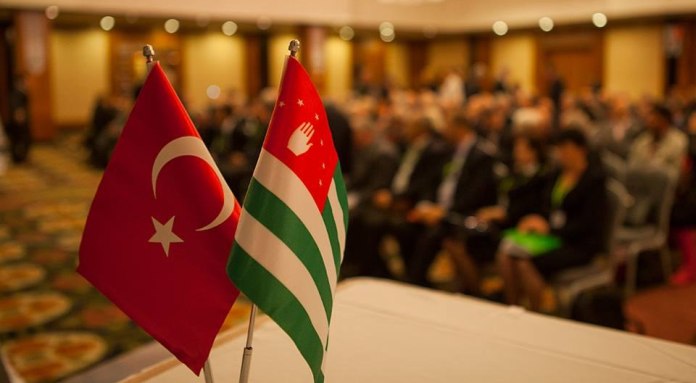A new era in Turkey-Abkhazia relations, by Hasan Kanbolat

Today's Zaman -- Between May 28-29, marches against the government protesting rising unemployment, prices and corruption began in Abkhazia. A factor that has been increasing the general displeasure there is that banks are making it more difficult for customers to get loans. As part of this, thousands of Abkhazians gathered in front of the presidential offices to call for President Alexander Ankvab's resignation.
Protesters even occupied government and television buildings, forcing President Ankvab to take shelter in the Russian base located in Gudauta. In the end, Ankvab was unable to withstand the pressure from the protests, and resigned; parliament then decided to hold early elections on Aug. 24. The entire process of uprising and the resignation of the president of Abkhazia took place according to the traditions found in the North Caucasus; these traditions are unlike those anywhere else in the world. First off, the protesters did nothing to cause damage to property in the course of their protests. Also, the police did nothing to hurt the protesters. And as for Ankvab's resignation, he was convinced by local elders to make that move.
The presidential elections held on Aug. 24 were won by former Prime Minister Raul Hadjimba. According to a statement from the Abkhazia Central Election Council, Hadjimba gained 50.57 percent of the vote, or some 50,494 votes. As for the other candidates, the president of the Abkhaz National Security Unit, Aslan Bjania, got 35.91 percent of the vote (35,860 votes), while Abkhaz Defense Minister Mirab Kişmariya got 6.4 percent and former Abkhaz Interior Minister Leonid Dzapşba got 3 percent. A full 70 percent of registered voters cast ballots in the election. According to the Abkhaz constitution, a candidate who gets 50 percent of the vote in the first round of presidential elections earns the right to become president. Outside of Abkhazia, votes in this election were also cast in Moldavia, Cherkessk and İstanbul. In fact, some 460 votes were cast for these elections at the “Ballot No. 6” that was set up in İstanbul's Kadıköy district.
The results from this ballot box in İstanbul were as follows: Raul Hadjimba 307 votes, Aslan Bjania 81 votes, Mirab Kişmariya 27 votes, Leonid Dzapşba five votes. This despite a situation where outside intervention by police into the use of this ballot box in the early hours of Aug. 24 wound up preventing citizens from voting, at least at first. However, the ban on the use of this box was lifted at around 4 p.m. that day, and voting went on into Aug. 25 as well. According to the Abkhaz constitution, any problems involving ballot boxes both inside and outside of Abkhazia can result in the election being voided, which made the intervention into the Turkish ballot box quite significant.
The Republic of Abkhazia is recognized as being an independent and sovereign state by a handful of states. It is generally thought that Abkhazians living in Turkey number twice as many as those who live in Abkhazia. And even though there are no direct political relations between Turkey and Abkhazia, the two states are not only geographically proximate to one another, but also have strong economic ties. All of this means that, for Turkey, Abkhazia is quite important. In the month of August of this year, presidential elections were held in both Turkey and Abkhazia. Hadjimba does not expect the country to be recognized by Turkey. What he does want, though, is to see greater ease in transportation back and forth between these two states, as well as economic relations and stronger relations between its people. Which is why he would like to come to Turkey and meet with President Recep Tayyip Erdoğan, even if only in an unofficial capacity. This is a meeting which many anticipate will occur in the coming months.
During 2013, the volume of foreign trade between Turkey and Abkhazia rose to $600 million. This is an amount which is not, however, reflected in official records. Instead, it is reflected in the foreign trade traffic occurring between Turkey and the Russian Federation, through the Sochi port. From Abkhazia, Turkey gets both coal and timber. There are large amounts of food, textiles and construction materials that are exported from Turkey to Abkhazia. Cargo ships carrying loads from Abkhazia use the ports in both İstanbul and Samsun. In Abkhazia, goods follow the Sochi-Sukhum road; there are also representatives for Turkish food, textile and construction companies in Sukhum.
Turkish companies have made significant investments in both the construction and agricultural sectors in Abkhazia. In the meantime, the Abkhaz diaspora is growing larger. Abkhazians coming from Turkey and Syria have managed to bring a new dynamism to their home country.